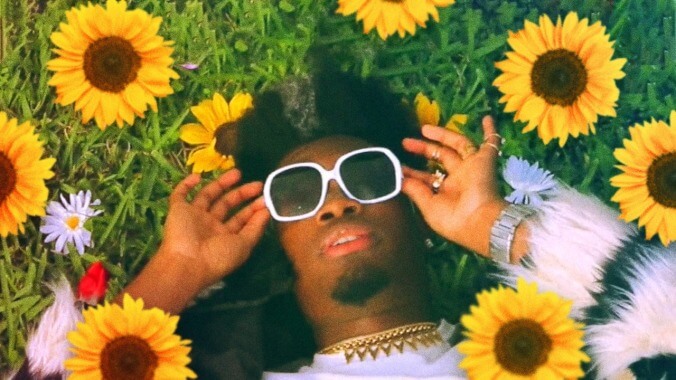Oliver Twixt is bringing queer Black Boy Joy to hip-hop

Atlanta-based rapper, writer, and producer Oliver Twixt (pronounced “twist”) uses very few words— “hip-hop artist and content creator,” to be exact—to encapsulate his creative essence. He’s the embodiment of “show, don’t tell”: With neon-piped fashion, a shocking streak of Storm-inspired silver hair, and an air-tight flow that drives each of his confident, succinct verses, Twixt lets his style speak for itself. “My work reflects how I view the world through these Black boy eyes of joy,” he explained to The A.V. Club. “Everything I make comes from my heart.”
Mind you, the busy artist and Morehouse alum makes quite a few things as a seasoned content creator, including reality television for the webseries Chasing Atlanta. What garners the most attention (aside from his boisterous style) are his electrifying remixes—ReTwixts, if you will—where he exorcises the kinetic energy he draws from a number of inspirations like Cardi B., Lil’ Kim, Nicki Minaj, Lizzo, and Janet Jackson, just to name a few. While women in hip-hop and R&B still struggle to receive the same robust recognition regularly heaped onto their male counterparts, Oliver pays fitting homage to some of those same female performers who, in part, inform his unique expressions of gender. “I’m very happy to be a man,” Oliver asserted. “However, I just felt like the attitude and mold in which a woman presents herself better suits me. This is why I wear clothes that accentuate my body or why I want to look pretty. I respond to that more than the idea of what it means to ‘be a man,’ so to speak. With that, I have always been so drawn to these powerful women who own their bodies, minds, and images.”
And the “Lolly” rapper, in his own way, offers nothing less: Much like his favored female predecessors, Twixt has fashioned his lyricism and bold style into a suit of armor, a way to protect both his peace and autonomy as a gay male rapper aiming to thrive in the hip-hop landscape. A relentlessly fun track like “Sugar,” which Twixt describes as a feel-good effort, even resonates as something radical in the face of an industry that has yet to loudly embrace queer expression from Black men. Armed with a playful Speedo, a breezy strut, and a megawatt smile, Twixt sets his insistence on having a good time—whether that means “being cute in the sands” or in the car with “Foxy Brown on the repeat”—to a sun-dappled Miami-style beat that exudes both summer vibes and unequivocal self-love.
It’s hard to tell whether or not an artist like Twixt would have been allowed the mainstream space to grow as a hip-hop artist even five years ago, when public support of the LGBTQ community from industry mainstays like Jay-Z still wasn’t enough to convince major labels to sign openly gay artists. That’s part of what makes Twixt’s work, imbued with a contagious kind of joy and unflappable confidence, so damn engaging: During a time when queer identity and gender expression were still very touchy subjects within the genre (or when it was seemingly, frustratingly only celebrated when straight artists experimented with their expression, like when Young Thug wore a dress in 2016 for his Jeffery album cover), artists like Twixt had to use their music in order to carve out a space where they could exist authentically. But Twixt remains optimistic that the major successes of Lil Nas X and Todrick Hall are signs of an evolving industry, one that will hopefully recognize him as the burgeoning force of nature that he is. “There are so many avenues for people who are not straight to make money as hip-hop artists,” he said. “My whole living comes from just being Oliver Twixt. That’s not something we probably would have seen years ago that we are seeing now. Is there more to be done? Of course, but have we come a long, long way.”